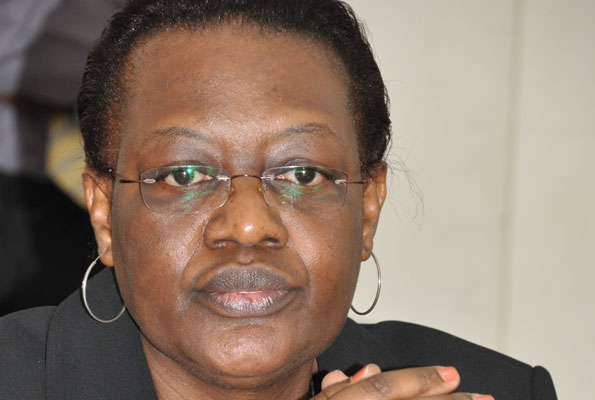The Inspectorate of Government headed by the Inspector General of Government (IGG) still has a long way to go following a revelation that it requires more funding to handle 4409 cases, as stated in its Budget Framework Paper (BFP) for the financial year 2018/19.
While presenting the BFP to MPs early this year the IGG-Irene Mulyagonja Kakooza, said then that a total of 4409 investigations were still ongoing, particularly the Directorate of Regional Offices was handling 4228 cases, Directorate of Ombudsman Affairs dealing with five cases while Information and Internal Inspection Division was handling 83 cases and Directorate of Special Investigations was looking into 93 cases.
Highlighting the achievements of the first half of financial year 2017/18, the IGG said 175 backlog cases were concluded by regional offices out of the 2106 cases available representing 8 percent. Directorate of Special Investigations managed to conclude 2 out of 87 backlog cases which represent 3 percent achievement. While 144(28 per cent) recommendations were followed up out of the 505.
The IGG blames the slowness in the handling of the cases on the limited funds allocated to them. In the financial year 2017/18, the IG approved budget was Shs45.421billion out of which Shs45.6 billion was released and Shs42.767 billion or 93.8 per cent was spent.
In the same period, the IG received a supplementary funding of Shs0.643 billion for payment of rent for the Head Office, PAYE, NSSF contributions and other operational expenses. This means there was no supplementary allocations to handle cases.
The IGG Irene Mulyagonja is unhappy that rent is eating into the budget for activities her office is mandated to do. For instance, she says the cost of rent is increasing from Shs2.285 billion in financial year 2017/18 to Shs2.756 billion in financial year 2018/19. Currently, she says, the IG is operating in rented office premises for both its head office and the 16 regional offices.
According to Mulyagonja,the rent problem is worsened by the fact that IG has to pay rent for the head office in dollars. “The rent for the head office is paid in US dollars, thus the continuous rise in the dollar has adversely affected the funds available for other activities given that rent is a primary cost to the institution’s existence and operations,” she cries.
The IG also faces the problem of unpredictable landlords for its regional offices. The landlords, according to the IGG, have a tendency of adjusting rents upwards at the end of tenancy agreements, which are not in tandem with the national budget process timeline.
The IG says it needs more funding to do its constitutional activities. “The IG has three core functions and these are Ombudsman role, Anti-corruption and Enforcement of Leadership Code of Conduct. Given the enormous activities under these functions, Shs45 billion is insufficient for the IG to effectively deliver on its mandate,” the document reads in part.
Though allocations to the Inspectorate have been increasing significantly over time, the institution is still faced with the challenge of inadequate resources. The IG has a funding gap of Shs3.827 billion, it adds.
Breakdown in grievance handling mechanisms
According to the IG’s BFP for 2018/19, there is complete breakdown in the internal complaints and grievance handling mechanisms in the ministries, district administrations and local governments (MDALGs). Previously government institutions had functional structures to manage complaints internally and would only refer cases which had either failed or those that were outside their jurisdiction to the Inspectorate of Government. “This situation has created increased workload as aggrieved public officers report to the Inspectorate as a first resort,” the BFP reads in part.
The IG reports that several constraints still remain and that enormously affect budget execution: They include the prevalence and complexity of corruption in the public and private sector. Of particular concern, the evolving nature of corruption is giving the IG officials sleepless nights. However, as this might be the problem, the IG is also blamed for shifting attention from big cases that involve big shots in government to minor cases of civil servants in districts. A case in point is the case involving former Executive Director in charge of Supervision at Bank of Uganda, Ms Justine Bagyenda who according to sources wasn’t investigated by the inspectorate despite the overwhelming evidence against her.
While previously limited to favours and bribes to a few officials, the situation now encompasses grand syndicated corruption where controls are deliberately circumvented in a systematic way, involving networks of corrupt officials from different MDA/LGs and private sector
“Increasing complexity of corruption; corruption is now sophisticated and involves wide network of people (syndicates) in and outside Uganda. Combating this type of corruption requires significant resources (financial and skilled human resources),” the IGG notes in BFP 2018/19.
There have been instances where the recommendations made by the IG have not been implemented upon completion of investigations, says the IGG. When such administrative sanctions of various officials are not effected promptly, the matters remain unresolved, she adds.
The above, according to the IGG is worsened by the poor methods of storage and retrieval of records and sharing in public offices. “Poor record keeping results in great difficulty for the IG to collect credible information from the public officers or offices. The absence of proper records has continuously created a bottleneck for investigations,” IGG Mulyagonja says.
Further Mulyagonja notes that the increasing cost of fuel, lubricants, oils and vehicle maintenance will affect the IG operations. This is because most of the IG activities involve travels to collect information and carry out prosecutions.
In order to overcome the above constraints, the Inspectorate in the financial year 2018/19, wants funding to complete construction of own head office but also wants additional funding of Shs2.66 billion to cater for operational and obligatory expenses. “This fund will also to finance the activities of the Directorate of Special Investigations which was established to expeditiously investigate grand and syndicated corruption,” IGG Mulyagonja says.
During the Ministerial Policy Statement considerations, the IGG indicated that she was targeting to register 200 and 250 cases of grand or syndicated corruption for financial year 2017/18 and 2018/19.
That has now come down to 75 cases in FY 2018/19. The cause of the changes in the targets set this year is that little money has been given for operations and more allocated to construction of the IG head office building.
However, as the IG fails to handle these cases on time, so is the investigative arm of Uganda police and the judiciary and so the question is who will save IGG and police from collapsing like the public service?
reports also indicate that although the IG is supposed to be the watchman of government, internally the institution is allegedly housing corrupt officials which makes it complex to fight the corrupt.







